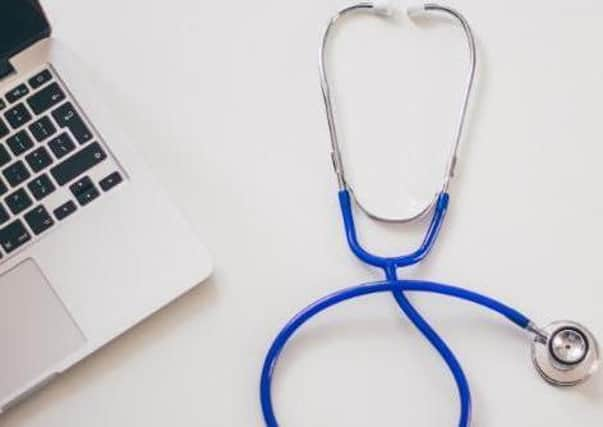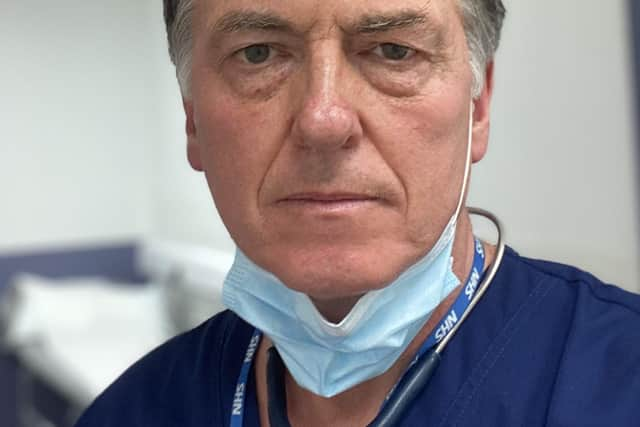Video and phone appointments on the rise as GPs in West Sussex adapt to lockdown


More than 80 per cent of GP appointments in the county took place face to face in the 12 months before lockdown, according to analysis by the BBC shared data unit.
Yet since the Government introduced stringent measures to contain the outbreak, GP surgeries have had to rely on technology more and more, significantly adapting the way they communicate with patients.
Face-to-face contact drops


Advertisement
Hide AdAdvertisement
Hide AdThe chairman of the Royal College of GPs said face-to-face contact with a GP is now making up just seven per cent of all contact.
He praised the profession’s ‘remarkable response’ to the challenge presented by coronavirus.
Figures from the three Clinical Commissioning Groups (CCGs) which cover West Sussex show that, between March 2019 and February 2020, only 13 per cent of GP appointments took place over the telephone.
This amounts to around 630,000 appointments.
Patients in the Horsham and Mid Sussex area were the least likely to interact with their GP via the phone.
Advertisement
Hide AdAdvertisement
Hide AdOnly eight per cent of appointments were carried out over the phone during this period (85,129 appointments in total), the analysis of figures from the Horsham and Mid Sussex CCG show.
When it comes to appointments carried out via video link or other online methods across West Sussex in the 12 months leading up to lockdown, the figures were even smaller.
Just 8,500 appointments (0.17 per cent) took place via this kind of technology.
A new way of working
Dr Tim Fooks, the High Sheriff of West Sussex, who is also a GP, said his practice – the Pulborough Medical Group – was now handling around 25 per cent of appointments via video call, or by people sending in photos.
Advertisement
Hide AdAdvertisement
Hide Ad“I think it’s actually working very well,” he said. “I’m not aware of any problems.”
He said it was ‘very helpful’ in the case of people with skin conditions, where a photo of the affected area could be easily diagnosed by doctors.
Video calls were also extremely helpful when it came to assessing patients in care homes, some of which have cases of coronavirus.
As GP surgeries have had to adapt to new ways of working, as well as deal with any instances of staff having to self-isolate, Dr Fooks said patients may be finding they were unable to speak to their usual doctor.
Advertisement
Hide AdAdvertisement
Hide AdBut he said: “Patients have been really patient, as well as the doctors and nurses and all the staff who have had to cope with these different ways of working.
“I think everyone has done an amazing job.”
He also said GP surgeries had started to become a lot busier. People who had initially been reluctant to contact their GP with non-coronavirus related issues were now getting in touch once more.
“The doctors have had a chance to cope with this new way of doing business, all of that is well established, but now doctors are finding the amount of work is going up,” he said.
In general, Dr Fooks said he believed patients were increasingly happy to use technology to communicate with their doctor, compared even with five years ago or so, and felt much more comfortable talking on the phone or on a video call.
Long-term effects
Advertisement
Hide AdAdvertisement
Hide AdAnd going forward, Dr Fooks said it was likely that more consultations would continue to be carried out this way.
Until there were tests for people to know for sure whether they had had the virus or not, it was likely social distancing measures would continue, he said.
Particularly vulnerable people were still only several weeks into a 12-week period of self isolation, he added.
But as well as being safe, appointments using phone or video methods were also more convenient for some people, he said, particularly for those for whom transport access to GPs was an issue.
The picture in West Sussex mirrors that across the UK.
Advertisement
Hide AdAdvertisement
Hide AdProfessor Martin Marshall, chairman of Royal College of GPs, said around 40 per cent of patients would normally be triaged before booking an appointment.
Now, all patients were being initially assessed on the phone before booking either a call or video link with a doctor.
“Most of the consultations are taking place on the telephone rather than video link,” he said.
“People are pretty happy with doing assessments over the phone and they are proving effective.
Advertisement
Hide AdAdvertisement
Hide Ad“Who would have thought this 150-year-old technology would still be just as useful today?”
Looking to the future, he also foresees that more appointments will take place using phone or video technology. He said: “The big question is which elements do we want to embed in our practices in the future? I don’t see us doing all of our consultations over the phone or online, but certainly up to 50 per cent is possible.”
However there were still occasions where patients need to attend a practice in person, such as where blood pressures or oxygen saturation needs to be read, he added.
Concerns for the elderly
A charity has raised concerns that people who do not have access to smartphones or a computer may be excluded from seeing their GP during the Coronavirus crisis.
Advertisement
Hide AdAdvertisement
Hide AdElderly needs charity Age UK said elderly or vulnerable people, who may be self-isolating at home, could be cut off from accessing vital services.
The charity is urging practices to be ‘proactive’ in contacting people on their registers who are known to have underlying health conditions.
Tom Gentry, senior health influencing manager at Age UK, said: “Surgeries have a lot of information at their disposal. Using that, they need to make active care plans for people to enable them to feel supported.
“It’s about not waiting for people to deteriorate and it’s about reaching out to them first.”
Advertisement
Hide AdAdvertisement
Hide AdMr Gentry said that surgeries should also not discount the use of home visits, providing adequate precautions are taken.
“No one should be told outright that they should not be visited in their own home,” he said.
‘My GP is absolutely brilliant’
However, many GP practices have already been adopting a proactive approach in order to reach residents.
Clive Williams, a fishing tackle supplier from Horsham, is caring for his wife Joanna, 63, at home as she has a brain tumour.
Advertisement
Hide AdAdvertisement
Hide AdHe was worried about going to a surgery because of the risk of infection – and because he did not want to add extra burden to his stretched local practice.
“I felt it would be a nuisance to get in touch with them,” the 64-year-old said.
“But my GP is absolutely brilliant.
“He contacted me out of the blue to have a little chat about my wife as she struggles with her memory.”
A message from the Editor, Gary Shipton:
In order for us to continue to provide high quality and trusted local news, I am asking you to please purchase a copy of our newspapers.
Advertisement
Hide AdAdvertisement
Hide AdWith the coronavirus lockdown having a major impact on many of our local valued advertisers - and consequently the advertising that we receive - we are more reliant than ever on you helping us to provide you with news and information by buying a copy of our newspapers.
Our journalists are highly trained and our content is independently regulated by IPSO to some of the most rigorous standards in the world. But being your eyes and ears comes at a price. So we need your support more than ever to buy our newspapers during this crisis.
Stay safe, and best wishes.